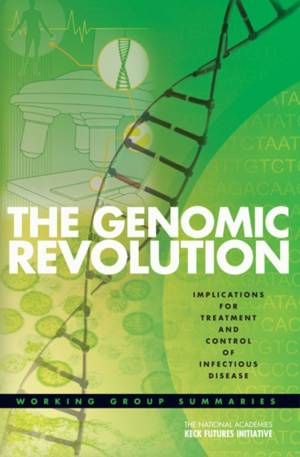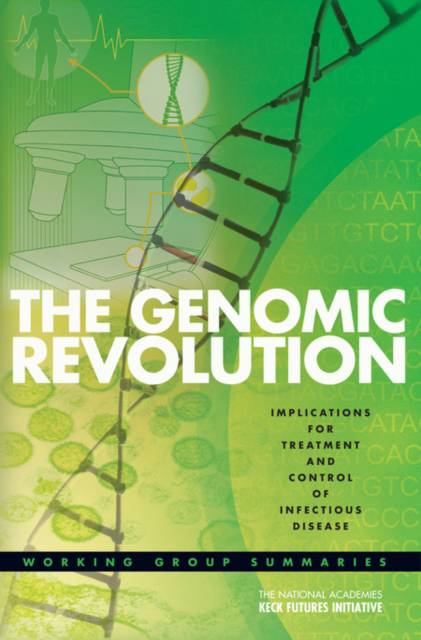
- Retrait gratuit dans votre magasin Club
- 7.000.000 titres dans notre catalogue
- Payer en toute sécurité
- Toujours un magasin près de chez vous
- Retrait gratuit dans votre magasin Club
- 7.000.0000 titres dans notre catalogue
- Payer en toute sécurité
- Toujours un magasin près de chez vous
The Genomic Revolution
Implications for Treatment and Control of Infectious Disease: Working Group Summaries
The National Academies, The National Academies Keck Futures Initiative Genomics Planning, The National Academies Keck Futures Initiative Genomics SteeringDescription
The 2005 conference, "The Genomic Revolution: Implications for Treatment and Control of Infectious Disease," attracted scientists, engineers, and medical researchers to work on new interdisciplinary responses using genomics to treat and control infectious diseases. Eleven conference working groups gave the participants eight hours to develop new research approaches to problems in infectious disease using genomics. Among the challenges were designing a new device to detect viral and bacterial pathogens; how best to use $100 million to prevent a future pandemic flu outbreak; how to improve rapid response to an outbreak of disease and reduce the cost of diagnostic tests; and how to sequence an individual's genome for under $1,000. Representatives from public and private funding organizations, government, industry, and the science media also participated in the working groups. This book provides a summary of the conference working groups. For more information about the conference, visit www.keckfutures.org/genomics.
The National Academies Keck Futures Initiative was launched in 2003 to stimulate new modes of scientific inquiry and break down the conceptual and institutional barriers to interdisciplinary research. The National Academies and the W.M. Keck Foundation believe considerable scientific progress and social benefit will be achieved by providing a counterbalance to the tendency to isolate research within academic fields. The Futures Initiative is designed to enable researchers from different disciplines to focus on new questions upon which they can base entirely new research, and to encourage better communication between scientists as well as between the scientific community and the public. Funded by a $40 million grant from the W.M. Keck Foundation, the National Academies Keck Futures Initiative is a 15-year effort to catalyze interdisciplinary inquiry and to enhance communication among researchers, funding agencies, universities, and the general public with the object of stimulating interdisciplinary research at the most exciting frontiers. The Futures Initiative builds on three pillars of vital and sustained research: interdisciplinary encounters that counterbalance specialization and isolation; the identification and exploration of new research topics; and communication that bridges languages, cultures, habits of thought, and institutions. Toward these goals, the National Academies Keck Futures Initiative incorporates three core activities each year: Futures conferences, Futures grants, and National Academies Communication Awards.
Spécifications
Parties prenantes
- Auteur(s) :
- Editeur:
Contenu
- Nombre de pages :
- 132
- Langue:
- Anglais
Caractéristiques
- EAN:
- 9780309101097
- Date de parution :
- 03-05-06
- Format:
- Livre broché
- Format numérique:
- Trade paperback (VS)
- Dimensions :
- 152 mm x 229 mm

Les avis
Nous publions uniquement les avis qui respectent les conditions requises. Consultez nos conditions pour les avis.






